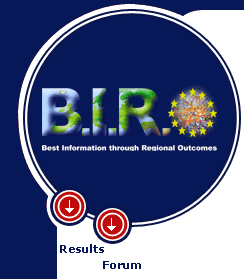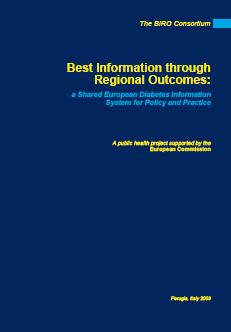
Supported by:





|
Building a Shared European Diabetes Information System
A Public Health Project funded by the European Commission, Health Information Strand, DG-SANCO 2005
INTRODUCTION
-
Our mission is to provide strategic information to support coordinated prevention, integrated care and outcomes management in diabetes across Europe
-
“Best Information through Regional Outcomes” (B.I.R.O.) is a three years public health project in the field of diabetes started on the 1st December 2005, sponsored by the European Union under the Health Information Strand of the Public Health Program (DG-SANCO)
-
B.I.R.O. is a European project in the area of public health aimed at providing European health systems with an ad hoc, evidence and population-based diabetes information system
-
The Consortium includes seven partners from academia and governmental institutions, sharing an extensive experience in diabetes research/chronic care management and a genuine enthusiasm for European health policy, as witnessed by a long series of international projects conducted on field over the last 20 years
RESULTS

WHO ARE THE BIRO USERS
| Governance |
Research |
Health Care |
Citizens |
|
|
|
-
Consumer organizations
-
Patients organizations
|
THE BIRO APPROACH
B.I.R.O. is a novel strategy for the routine production of reliable European summary indicators such as those identified by the EUDIP project. The proposal targets better collection and integration of regional data, focusing on a level where there is a higher chance of improving precision at the lowest cost through the involvement of local users
-
The Consortium is conducting practical activities on field to pool results from different registers that are already in place to support daily care management. We are proceeding to the definition of a common structure that allows to conduct a simultaneous analysis of quality and outcomes of diabetes care at the regional, national, and European level
-
The project, through the active participation of seven regions, defines common standards for the rapid aggregation of comparable data, developing ad hoc routines for secure information exchange and analytical tools that produce a range of outputs
-
The resulting system will continue to work on top of routine databases, applying open source software in a self-sustainable way that can be easily generalized to other situations and extended across Europe
|
|
 Why BIRO?
Why BIRO?  Partners
Partners  Objectives
Objectives  Activities
Activities  Documents
Documents  Restricted Area
Restricted Area  Links
Links  Contacts
Contacts 









